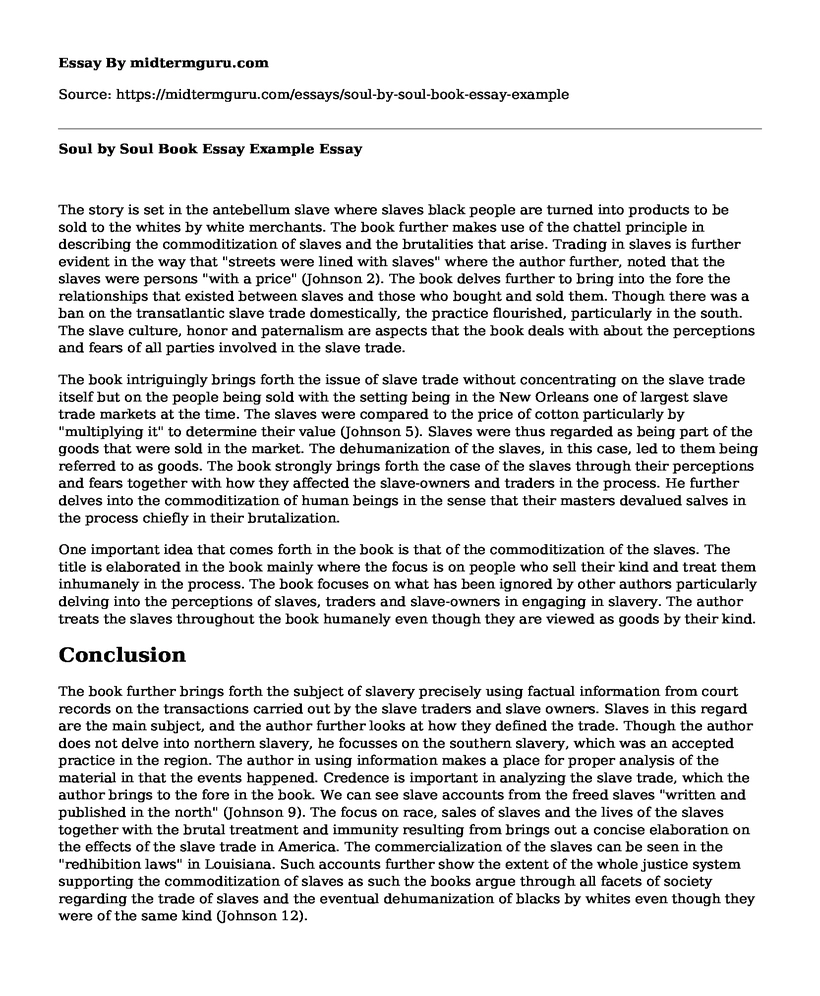The story is set in the antebellum slave where slaves black people are turned into products to be sold to the whites by white merchants. The book further makes use of the chattel principle in describing the commoditization of slaves and the brutalities that arise. Trading in slaves is further evident in the way that "streets were lined with slaves" where the author further, noted that the slaves were persons "with a price" (Johnson 2). The book delves further to bring into the fore the relationships that existed between slaves and those who bought and sold them. Though there was a ban on the transatlantic slave trade domestically, the practice flourished, particularly in the south. The slave culture, honor and paternalism are aspects that the book deals with about the perceptions and fears of all parties involved in the slave trade.
The book intriguingly brings forth the issue of slave trade without concentrating on the slave trade itself but on the people being sold with the setting being in the New Orleans one of largest slave trade markets at the time. The slaves were compared to the price of cotton particularly by "multiplying it" to determine their value (Johnson 5). Slaves were thus regarded as being part of the goods that were sold in the market. The dehumanization of the slaves, in this case, led to them being referred to as goods. The book strongly brings forth the case of the slaves through their perceptions and fears together with how they affected the slave-owners and traders in the process. He further delves into the commoditization of human beings in the sense that their masters devalued salves in the process chiefly in their brutalization.
One important idea that comes forth in the book is that of the commoditization of the slaves. The title is elaborated in the book mainly where the focus is on people who sell their kind and treat them inhumanely in the process. The book focuses on what has been ignored by other authors particularly delving into the perceptions of slaves, traders and slave-owners in engaging in slavery. The author treats the slaves throughout the book humanely even though they are viewed as goods by their kind.
Conclusion
The book further brings forth the subject of slavery precisely using factual information from court records on the transactions carried out by the slave traders and slave owners. Slaves in this regard are the main subject, and the author further looks at how they defined the trade. Though the author does not delve into northern slavery, he focusses on the southern slavery, which was an accepted practice in the region. The author in using information makes a place for proper analysis of the material in that the events happened. Credence is important in analyzing the slave trade, which the author brings to the fore in the book. We can see slave accounts from the freed slaves "written and published in the north" (Johnson 9). The focus on race, sales of slaves and the lives of the slaves together with the brutal treatment and immunity resulting from brings out a concise elaboration on the effects of the slave trade in America. The commercialization of the slaves can be seen in the "redhibition laws" in Louisiana. Such accounts further show the extent of the whole justice system supporting the commoditization of slaves as such the books argue through all facets of society regarding the trade of slaves and the eventual dehumanization of blacks by whites even though they were of the same kind (Johnson 12).
Works Cited
Johnson, Walter, Soul by Soul: Life Inside the Antebellum Slave Market. Harvard: Harvard University Press, 2000. Print.
Cite this page
Soul by Soul Book Essay Example. (2022, Aug 18). Retrieved from https://midtermguru.com/essays/soul-by-soul-book-essay-example
If you are the original author of this essay and no longer wish to have it published on the midtermguru.com website, please click below to request its removal:
- Literature Essay on Winter's Bone by Daniel Woodrell
- Nationalism, Imperialism, and Militarism in World War I - Paper Example
- Paper Example on Leadership Qualities: Ida B. Wells Jr, and Martin Luther King
- Research Paper on The Second World War
- The Great Depression: US's New Deal to Overcome Financial Hardships - Research Paper
- American Revolution: War for US Freedom (1775-1783) - Essay Sample
- Are Dinosaurs Real? A Definition and Explanation - Essay Sample







